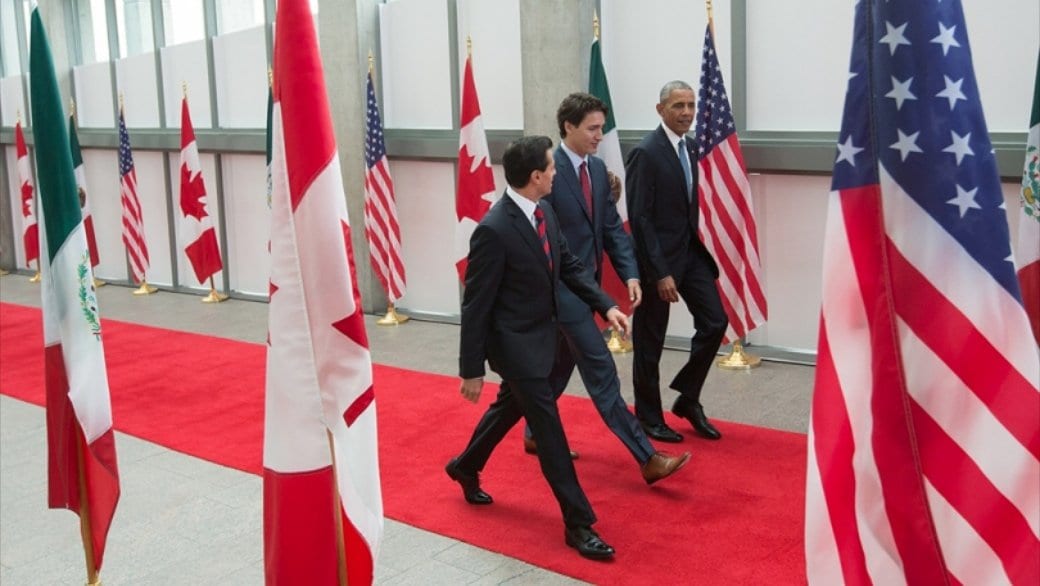The Three Amigos were sticking to a sunny script at last month’s summit in Ottawa. More than sunny, the meeting of the three North American leaders was rainbow-coloured.
The summit, focusing on progressive unity, solidarity and cooperation, happened during the backdrop of Pride month. All three leaders were quick to emphasize their commitment to the LGBT community.
In the past month, Mexican President Enrique Peña Nieto proposed to legalize same-sex marriage after the Supreme Court ruled last year that it was unconstitutional to prevent such unions. Just a few weeks ago, US President Barack Obama, in response to the shooting at a gay nightclub in Orlando spoke of the victims as part of the “American family.” Meanwhile, Canadian Prime Minister Justin Trudeau made history as the first prime minister to march in Toronto’s Pride parade on July 3, 2016.
Yet when it comes to the protection of the most marginalized LGBT individuals, the Three Amigos are conspicuously silent.
Last summer, refugee lawyer Kristin Marshall and I travelled to Mexico to investigate Canada’s designation of the country as a “safe” haven for refugees. Our findings, detailed in a report released by the International Human Rights Program (IHRP) at the University of Toronto, showed rampant human rights violations against people living with HIV and at heightened risk of infection and insufficient state accountability, making Mexico unsafe for many.
Our interviews with journalists, academics, and human rights defenders crystallized for us that Canada’s policy for Mexican claimants was clearly misguided and in crucial need of reform. Our interviews also described a hierarchy of vulnerability in Mexico. At the very bottom, languishing in a human rights desert, are LGBT migrants who face intersecting oppressions and violence that render their lives and experience invisible.
Each year, hundreds of thousands of people migrate to Mexico from Central America. Many — and it is impossible to know exactly how many — are undocumented LGBT individuals who seek refuge from increasing homophobic and transphobic violence in El Salvador, Guatemala and Honduras.
Despite being a signatory to the United Nations’ Refugee Convention and the 1967 Protocol Relating to the Status of Refugees, Mexico’s asylum system is inadequate and fails to protect the rights of asylum seekers. Authorities detain migrants without offering them an opportunity to apply for asylum. In fact, we heard many stories of potential claimants being dissuaded from seeking asylum.
Instead of protection, these individuals are faced with grave dangers as they seek to reach the American border. Due to pressure from the United States government to keep undocumented migrants out, Mexico launched a program in 2014 to curb migration flows and send Central Americans back over its southern border. Programa Frontera Sur, though ostensibly meant to protect migrants, has resulted in a drastic increase in the detention and vulnerability of migrants and asylum seekers in Mexico, among them, sexual minorities.
Mexico now detains more Central American migrants than the United States. In 2014, Mexican authorities detained over 100,000 migrants, a third more than in 2013. Detention centres are prison-like, overcrowded and dangerous. These centres are especially dangerous for transgender and gender-nonconforming individuals who are placed in sections according to the gender noted on their identification cards, or worse, are separated from the general population and placed in sections meant to be solitary cells but become overcrowded with other gender-nonconforming people. There is virtually no access to legal representation or healthcare.
If the migrants manage to evade detention, they face a perilous journey through Mexico. For some time now, Mexican authorities have been forcibly removing migrants from the northbound cargo train known as “The Beast.” We even visited a shelter in southern Mexico dedicated to caring for migrants who have lost limbs or been seriously injured by authorities who pushed them off the train.
As a result, migrants are forced to take more irregular routes through small towns via more precarious modes of transportation. This is a life-threatening proposition for LGBT migrants who are vulnerable to abuse and violence at the hands of Mexican authorities, gangs or other migrants who target them because they are sexual minorities. Médecins Sans Frontières told us that 55 percent of the migrants interviewed at their sites revealed they had been victims of some kind of violence in transit. We heard from many that female migrants, especially transgender women, are likely to be raped during their journey through Mexico.
Despite Mexican law that guarantees access to healthcare regardless of one’s status in the country, migrants are not able to access such care consistently. Only one clinic in the country provides free healthcare for undocumented migrants and has policies sensitive to sexual minorities; other options are few and far between. For migrants living with HIV, this means they will not be able to access medication on a regular basis, if at all, resulting in potentially life-threatening complications.
This may not be sunny enough for the Three Amigos’ conference table, but in this time of mobility and intolerance, silent complicity is unacceptable. It is crucial that we hold our leaders to account and insist on protection for all LGBT individuals and an end to impunity for those responsible for these grave human-rights violations.
Maia Rotman is a third-year student at the University of Toronto’s faculty of law and co-authored the report, ‘Unsafe’ and on the Margins: Canada’s Response to Mexico’s Mistreatment of Sexual Minorities and People Living with HIV,” on behalf of the International Human Rights Program.


 Why you can trust Xtra
Why you can trust Xtra


